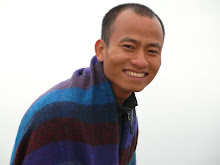YANGON (Reuters) – Myanmar's biggest military-backed party won the country's first election in 20 years by a landslide on Tuesday after a carefully choreographed vote denounced by pro-democracy parties as rigged to preserve authoritarian rule.
Opposition parties conceded defeat but accused the military junta of fraud and said many state workers had been forced to support the army-backed Union Solidarity and Development Party (USDP) in advance balloting ahead of Sunday's vote.
Opposition parties conceded defeat but accused the military junta of fraud and said many state workers had been forced to support the army-backed Union Solidarity and Development Party (USDP) in advance balloting ahead of Sunday's vote.
U.S. President Barack Obama told a news conference in IndonesiaMyanmar's election was neither free nor fair and called on Burmese authorities to immediately and unconditionally release all political prisoners.
But China's Ministry of Foreign Affairs lauded the election as "peaceful and successful," illustrating strengthening ties between energy-hungry China and its resource-rich neighbor.
As the votes were counted, government soldiers cleared ethnic minority rebels from an eastern border town after two days of sporadic clashes that killed at least 10 people and sent about 18,000 civilians fleeing into neighboring Thailand.
Many refugees had returned to Myanmar by afternoon as the military pushed back the ethnic minority Karen rebels who have resisted central authority for generations since what was then Burma won independence in 1948 from Britain.
U.N. refugee agency UNHCR says it is helping about 15,000 refugees who fled to Thailand from fighting in Myawaddy, and monitoring another 3,000 who fled from another area of Myanmar.
The fighters say the election and the military's continued dominance threaten any chance of achieving a degree of autonomy.
Stacked with recently retired generals and closely aligned with 77-year-old paramount leader Senior General Than Shwe, the USDP took as many as 80 percent of the available seats for parliament, a senior USDP official told Reuters.
But Khin Maung Swe, leader of the National Democratic Force, the largest opposition party, told Reuters: "We took the lead at the beginning but the USDP later came up with so-called advance votes and that changed the results completely, so we lost."
The second-largest pro-democracy party, the Democratic Party (Myanmar), also conceded defeat.
"I admit defeat but it was not fair play. It was full of malpractice and fraud and we will try to expose them and tell the people," its leader, Thu Wai, told Reuters.
At least six parties have lodged complaints with the election commission, accusing the USDP of fraud -- a charge that is unlikely to gain traction in a country where more than 2,100 political activists are behind bars.
FOCUS ON SUU KYI
The vote was held with Nobel laureate and pro-democracy leader Aung San Suu Kyi in detention and her party disbanded for refusing to take part in an election it said was unfair. She had urged supporters to boycott the poll.
With the election over, the spotlight returns to Suu Kyi, who has spent 15 of the past 21 years in detention but is due to be freed when her latest house arrest term expires on Saturday.
The United States, Britain, the European Union and Japan repeated calls this week to free the 65-year-old pro-democracy leader whose National League for Democracy beat an army-backed party by a landslide in 1990, a result ignored by the junta.
The army-backed USDP's only real rival, the National Unity Party (NUP), also backed by the army, fared poorly in its quest for 980 seats, winning just 54 in the bicameral parliament and state assemblies.
"Some representatives of our party filed complaints about fraud and malpractice by the USDP," said Tin Aung, a senior NUP official. A strong showing by the NUP would have been seen as a jab against Than Shwe since it is thought to be closer to a different faction in the army.
By crushing the NUP, the junta reduces the chance of fissures in the military spilling into the open in parliament.
Already, 25 percent of the seats in parliament are reserved for serving generals. Lawmakers are expected to rubber-stamp policies by a cabinet appointed by a president who is not elected by the people but appointed by a parliamentary committee.
Opposition lawmakers will have little say and no chance to secure the 75 percent of votes needed to amend a constitution that favors and reserves power for the military.
The armed forces supreme commander will choose three serving generals to head defense, interior and border affairs ministries.
This is why critics scoff at the military junta's assertion that the new government will reflect the will of the people. In fact, parliament will have very limited power.
Myanmar's neighbors and partners in ASEAN have been hoping the election would end Myanmar's isolation and remove hurdles it poses to greater cooperation with the West.
China has built up close political and business links with Myanmar while the West has for years shunned its leaders and imposed sanctions over the suppression of democracy and a poor human rights record.
Russia also welcomed the vote.
"We see the elections as a step in the democratization of Myanmar society in accordance with the political reforms taken by the country's leadership," Russia's Ministry of Foreign Affairs said in a statement.
(Additional reporting by Vorasit Satienlerk, Panarat Thepgumpanant and Somjit Rungjumratrussamee, and Lucy Hornby in Beijing; Writing by Robert Birsel and Jason Szep; Editing by Sugita Katyal)



















0 comments